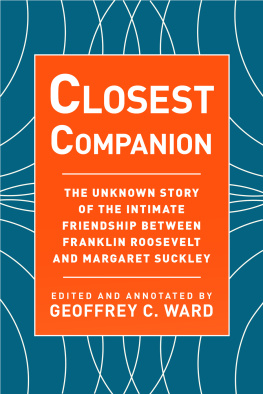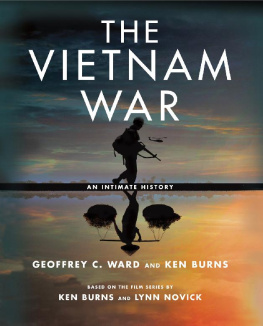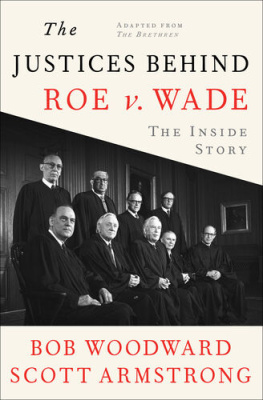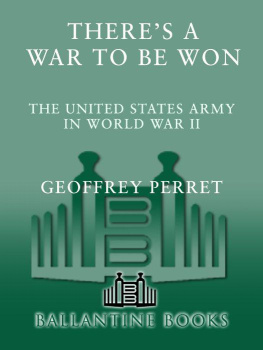Praise for
Closest Companion
Engrossing.... An unexpectedly sweet story in a terrible time.... What Ward is able to demonstrate, through their letters and diaries, is the closest friendship of our complex, mysterious president.... Ward has made FDRs story something no one else has managed to do.
Gore Vidal, The New York Review of Books
A remarkable portrait of FDR and the personal crises he faced during his presidencyjealous friends, demanding colleagues, family disappointments, loneliness, declining health and mental fatigue.... This portrait of FDRs awareness of his physical limitations is one of the books major contributions to the study of the Roosevelt presidency.... Offers invaluable insights into FDR the man and the leader.
Allida M. Black, The Washington Post Book World
A fascinating, very personal view of the man and his life.
USA Today
A fresh portrait of a presidents private moments.... Offers new insights about the president.
Mary B. W. Tabor, The New York Times (feature article)
A serious contribution to history.
Arthur Schlesinger, Jr.
Adroitly edited by Geoffrey C. Ward... from Closest Companion we learn that the relationship went much deeper and was much more charged with meaning than anyone has suspected till now.
R.W.B. Lewis, The New York Times Book Review (page 1 review)
FDR once told his cousin Margaret Suckley that she was the only person with whom he could be entirely himself. These diaries and letters amply confirm this. It is astonishing and exhilarating, in view of all that has been written about him, that we should at this late date have a wholly new and even more sympathetic picture of this curiously lonely great man in his private moments in the White House, Hyde Park, and Warm Springs.
Louis Auchincloss
A new mirror on Roosevelts moods in the war.... What carries you along at first is the sheer wonder of the circumstances Miss Suckley found herself in.... As astonishment wears off, you are struck by the private view of Roosevelt that the book reveals.
Christopher Lehmann-Haupt, The New York Times
Margaret Suckley played a central role in the presidents life, offering him support and companionship for many years.... Ward writes with sympathy and balance, giving a warm, relaxed picture of the president and this odd relationship.
Herbert Kupferberg, Parade
An invaluable portrait of FDR in his off-hours. A measure of the extraordinary trust he placed in Suckley is that he confided to her details of his secret meeting with Churchill off Canadas coast in August 1941 and of the impending D-Day invasion, as well as his frustrations with his job and his plans for the postwar world.
Publishers Weekly
This volume of letters and diary entries shows readers a side rarely seen before.... FDR trusted Daisy implicitly, disclosing his doubts about winning and surviving a fourth term, his longing for a quieter post-White House career (he thought of quitting the presidency to lead the newly formed UN), even the imminent invasion of Normandy in 1944. Her unique access reveals an unbuttoned FDR: venting otherwise carefully guarded frustration and loneliness, plying White House guests with cocktails and stories, secretly visiting old flame Lucy Mercer Rutherford, and rapidly deteriorating under the burden of winning the war.... An important close-quarters view of a complex president and human being.
Kirkus Reviews
About the Editor
G EOFFREY C. W ARD is the bestselling author of two books about FDR Before the Trumpet and A First-Class Temperament and the coauthor (with Ken Burns) of The War, The Civil War, Jazz, and Baseball. The former editor of American Heritage magazine, he is the winner of many awards, including six Emmys, the Parkman Prize for history, and the National Book Critics Circle Award. He lives in New York.
Thank you for purchasing this Simon & Schuster eBook.
Join our mailing list and get updates on new releases, deals, bonus content and other great books from Simon & Schuster.
C LICK H ERE T O S IGN U P
or visit us online to sign up at
eBookNews.SimonandSchuster.com

Contents

19331941
Our Hill: The Years Before the War
1942
The One Focus of Everyones Eyes
1943
The Luckiest Person Alive
1944
The Whole World Needs Him
1945
There Is So Little One Can Do

For Diane, again

Preface
M ARGARET L YNCH S UCKLEY was Franklin Roosevelts closest companion during the last years of his life. No one was more often with him during World War II than the quiet, good-humored distant cousin he called Daisy. She was admiring and circumspect, perfectly content to remain in the background as long as she could be near him, concerned always about his well-being. Hers is a familiar name in the Roosevelt literature attending picnics; riding in FDRs automobile; working over his papers with him at the Franklin D. Roosevelt Library at Hyde Park or in his White House study; walking Fala, the celebrated Scottie she had given him; and, finally, at the Presidents side when he was fatally stricken at Warm Springs, Georgia. But she has remained little more than a name until now, and some members of Roosevelts White House staff, put off by her constant but mostly silent presence, fooled by the skill with which she played what she herself once called my part of prim spinster, and sometimes alarmed at what they believed to be her dangerous meddling with the Presidents failing health, even privately dismissed her among themselves as the little mud wren.
That was pretty much how she wanted it. She told two generations of scholars who came to call at Wilderstein, her familys home in Rhinebeck, New York, that she really had very little to add to the Roosevelt story, had simply been privileged to be a social friend of the Presidents. When asked whether she had ever kept a diary, she would smile and reply with a question of her own: What makes you think I would keep a diary?
She died at Wilderstein in 1991 in her one-hundredth year. Shortly afterward, friends cleaning out her cluttered bedroom found a battered black suitcase beneath her bed. In it was a bundle of papers that showed she had not been entirely forthcoming with her visitors. There were in fact thousands of pages of diaries, covering the period from 1933, when she began to see a good deal of the President, until the day he died. And there were scores of her letters to FDR, as well as thirty-eight letters from him to her some of them running on for pages, all handwritten, many of them more revealing of his inner thoughts than any he is known to have written to anyone else during his years in office.
Daisy Suckley was no literary stylist. She was determinedly reticent and not much concerned with politics or world events. And she was blindly partisan, never veering far from the opinion of FDR she formed the first time he ever took her driving in his open roadster in the spring of 1933: The President is a MAN mentally, physically, & spiritually What more can I say?
But her letters and journals nonetheless provide an invaluable record of Franklin Roosevelt in his off-hours, away from the crises that haunted his presidency. Others close to Roosevelt might have provided an equally intimate portrait Marguerite LeHand, Louis Howe, Harry Hopkins, Pa Watson, the Presidents daughter, Anna but none lived long enough to do so. It will be impossible for any future biographer of Roosevelt, any chronicler of the years through which he led his country, to overlook this entirely unexpected trove.
Next page






